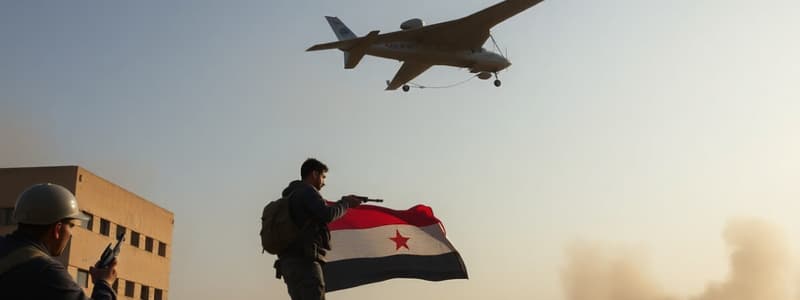Podcast
Questions and Answers
Which event marked the beginning of the Syrian civil war?
Which event marked the beginning of the Syrian civil war?
- The Iranian intervention in 2014
- The U.S.-led coalition's bombing campaign
- The capture of Raqqa by rebel forces
- Large-scale protests against Bashar al-Assad (correct)
What significant change occurred due to the military interventions by Iran and Russia?
What significant change occurred due to the military interventions by Iran and Russia?
- The balance of the conflict shifted in favor of the government (correct)
- The Islamic State was able to capture Damascus
- The Kurdish forces became the dominant power in Syria
- Rebels gained control of the entire country
Which group was primarily responsible for the offensive that led to the capture of Aleppo, Hama, and Homs in November 2024?
Which group was primarily responsible for the offensive that led to the capture of Aleppo, Hama, and Homs in November 2024?
- The Free Syrian Army
- The Syrian Democratic Forces
- Tahrir al-Sham and allied groups (correct)
- The Islamic State
What was a significant outcome of the Islamic State's territorial defeat by late 2017?
What was a significant outcome of the Islamic State's territorial defeat by late 2017?
What action did Turkey take in response to the creation of Rojava in 2016?
What action did Turkey take in response to the creation of Rojava in 2016?
Which statement accurately describes the leadership transition in Syria after Hafez al-Assad's death?
Which statement accurately describes the leadership transition in Syria after Hafez al-Assad's death?
What was a significant feature of the Syrian Ba'ath Party's ideology under Hafez al-Assad?
What was a significant feature of the Syrian Ba'ath Party's ideology under Hafez al-Assad?
How did Bashar al-Assad view the opposition forces in Syria?
How did Bashar al-Assad view the opposition forces in Syria?
What role did the Ba'ath party's 1973 Constitution assign to the party?
What role did the Ba'ath party's 1973 Constitution assign to the party?
Which demographic group in Syria constituted the largest percentage according to the 2018 population estimates?
Which demographic group in Syria constituted the largest percentage according to the 2018 population estimates?
What was a significant turning point in the Syrian civil war following the protests in 2011?
What was a significant turning point in the Syrian civil war following the protests in 2011?
Which factions are primarily opposed to the Syrian Arab Republic during the civil war?
Which factions are primarily opposed to the Syrian Arab Republic during the civil war?
What role did the U.S. military coalition play in the Syrian conflict?
What role did the U.S. military coalition play in the Syrian conflict?
What were the results of the fighting in 2023, as noted in the ongoing Syrian conflict?
What were the results of the fighting in 2023, as noted in the ongoing Syrian conflict?
Which international actors have been notably accused of severe human rights violations during the Syrian civil war?
Which international actors have been notably accused of severe human rights violations during the Syrian civil war?
What was a significant consequence of the drought in Syria from 2006 to 2011?
What was a significant consequence of the drought in Syria from 2006 to 2011?
What was Bashar al-Assad's response to the proposal for the Qatar-Turkey pipeline?
What was Bashar al-Assad's response to the proposal for the Qatar-Turkey pipeline?
Which of the following factions is aligned with the Kurdish-led forces in Syria?
Which of the following factions is aligned with the Kurdish-led forces in Syria?
Which country did not provide support to Syrian rebel groups during the civil war?
Which country did not provide support to Syrian rebel groups during the civil war?
What was the situation regarding human rights in Syria prior to the 2011 uprising?
What was the situation regarding human rights in Syria prior to the 2011 uprising?
What type of chemical weapon was confirmed by UN inspectors to have been used in multiple attacks during the Syrian conflict?
What type of chemical weapon was confirmed by UN inspectors to have been used in multiple attacks during the Syrian conflict?
Which military action by the United States was prompted by a chemical attack in Syria?
Which military action by the United States was prompted by a chemical attack in Syria?
Which type of weapon was notably used by the Syrian Army that left unexploded bomblets posing a danger to civilians?
Which type of weapon was notably used by the Syrian Army that left unexploded bomblets posing a danger to civilians?
Which armed group’s presence in Syria intensified the conflict and led to Israeli airstrikes on their targets?
Which armed group’s presence in Syria intensified the conflict and led to Israeli airstrikes on their targets?
What type of warfare method did Russia deploy extensively that can affect large urban areas?
What type of warfare method did Russia deploy extensively that can affect large urban areas?
Flashcards
Syrian Civil War Start
Syrian Civil War Start
Protests against Bashar al-Assad in March 2011, escalating into a multi-sided war.
Multiple Sides in Syrian War
Multiple Sides in Syrian War
The Syrian civil war involves state actors (like Russia, Iran) and many non-state groups (rebels, ISIS).
Islamic State's Role
Islamic State's Role
ISIS controlled parts of Syria and Iraq, facing counter-attacks by US-led coalition and Syrian forces, eventually losing territory.
Foreign Intervention in Syria
Foreign Intervention in Syria
Signup and view all the flashcards
Idlib Region
Idlib Region
Signup and view all the flashcards
Syrian Civil War's major factions
Syrian Civil War's major factions
Signup and view all the flashcards
2011 Syrian Protests
2011 Syrian Protests
Signup and view all the flashcards
Syrian Civil War's deadliest conflict year(s)
Syrian Civil War's deadliest conflict year(s)
Signup and view all the flashcards
Foreign involvement in Syrian Conflict
Foreign involvement in Syrian Conflict
Signup and view all the flashcards
2019 Kurdish Deal
2019 Kurdish Deal
Signup and view all the flashcards
Assad regime's power structure
Assad regime's power structure
Signup and view all the flashcards
Ba'ath Party's role
Ba'ath Party's role
Signup and view all the flashcards
Hafez al-Assad's rule
Hafez al-Assad's rule
Signup and view all the flashcards
Bashar al-Assad's initial image
Bashar al-Assad's initial image
Signup and view all the flashcards
Syria's Demographic make-up
Syria's Demographic make-up
Signup and view all the flashcards
Syrian Drought
Syrian Drought
Signup and view all the flashcards
Damascus Spring
Damascus Spring
Signup and view all the flashcards
Qatar-Turkey Pipeline
Qatar-Turkey Pipeline
Signup and view all the flashcards
Syrian Opposition Groups
Syrian Opposition Groups
Signup and view all the flashcards
Hezbollah's Role
Hezbollah's Role
Signup and view all the flashcards
Chemical Weapons in Syria
Chemical Weapons in Syria
Signup and view all the flashcards
Assad Regime's Responsibility
Assad Regime's Responsibility
Signup and view all the flashcards
Thermobaric Weapons
Thermobaric Weapons
Signup and view all the flashcards
Cluster Bomb Usage
Cluster Bomb Usage
Signup and view all the flashcards
Anti-tank Missiles in the Conflict
Anti-tank Missiles in the Conflict
Signup and view all the flashcards
Study Notes
Syrian Civil War (2011-present)
- Origins: Popular discontent with Bashar al-Assad's rule, part of the Arab Spring, triggered large-scale protests in March 2011. Government crackdown led to armed rebel groups forming, escalating into civil war by mid-2012.
Course of Events
-
Factions: Multiple state-sponsored and non-state actors involved, including the Syrian Arab Armed Forces (pro-Assad), various rebel groups (e.g., Free Syrian Army, Syrian National Army, Syrian Salvation Government), Kurdish-led Syrian Democratic Forces (SDF), and jihadist groups (e.g., Islamic State, al-Qaeda affiliates).
-
Foreign Involvement: Key foreign actors include Iran, Russia, Turkey, and the U.S., providing varying levels of support to different factions. Iran, Russia, and Hezbollah actively support Assad. U.S.-led coalition primarily targets ISIS. Turkey supports Syrian National Army, but also fights ISIS and Assad's forces.
-
Escalation and Shifts: Rebel gains initially, followed by Iranian and Russian military interventions from 2014 and 2015 respectively, shifting the balance towards the government. Islamic State's rise and territorial control in 2014 further complicated the conflict.
-
Recent Developments: Violent fighting largely subsided after 2017, but characterized by skirmishes. Major offensive by rebels in November 2024 led to recapture of some key cities (Aleppo, Hama, Homs, Daraa, Suwayda). Assad regime's control weakened.
Key Characteristics
-
Sectarianism: Conflict heavily influenced by sectarian divisions, aligning with Sunni-Alawite divide. Shia militias have played a significant role.
-
Human Rights Violations: Widespread human rights abuses committed by all sides, including massacres, torture, and the use of chemical weapons. Significant numbers of Alawis, Sunnis, and Christians have been affected by the war. ISIS engaged in public executions and other atrocities.
-
Refugee Crisis: Millions of Syrians fled to neighboring countries, creating a major humanitarian crisis.
-
International Involvement: International organizations played a significant role in peace efforts and humanitarian aid; however, ongoing debates over sanctions and cross-border aid continued. International organizations document chemical weapons attacks by the Syrian regime.
-
International Condemnation: Widespread international condemnation of the Syrian government for human rights abuses.
-
Humanitarian Aid: International aid organizations attempted humanitarian relief efforts but faced opposition and challenges in delivering aid to besieged areas. UNOCHA and UNICEF are central to aid efforts.
-
Chemical Weapons: Confirmed use of chemical weapons (sarin, mustard agent, chlorine gas) by the Syrian government and Islamic State. Some accusations made against other parties.
Current Situation
- Stalemate: The conflict has largely settled into a stalemate by early 2023, with military conflict not exclusively between the government and rebels, but increasingly between Turkish and Kurdish forces.
- Ongoing Conflict: Fighting in certain regions (particularly northwestern Syria) remains active.
- Kurdish Autonomy: The AANES (Rojava) remains a de facto autonomous region, facing threats from Turkey.
- Negotiations: Efforts towards political settlements remain ongoing with varying results. Cross-border aid negotiations ongoing at the UN are contentious.
Casualties and Impacts
-
Deaths and Injuries: Estimated hundreds of thousands of violent deaths and millions injured.
-
Economic Impact: The war has caused severe economic damage and hardships for Syrians.
-
Cultural Loss: Many heritage sites have been damaged or destroyed.
-
Displacement of Alawite community: A third of Alawite males of military age killed fighting.
-
Crime: A surge in crime, looting, theft, kidnapping, extortion and smuggling resulting from the conflict.
-
Internal Displaced Persons (IDPs): Millions displaced within Syria.
-
Foreign fighters and children: Hundreds of foreign fighters, including children, involved in the conflict. Children recruited as fighters, and kept in camps and prisons.
Studying That Suits You
Use AI to generate personalized quizzes and flashcards to suit your learning preferences.




